The last few years have seen no shortage of discussion of 1999 as the last great year in movies—and perhaps even as the best ever. Following Brian Raftery’s 2019 publication of Best. Movie. Year. Ever.: How 1999 Blew Up the Big Screen, dozens of essays and listicles popped up touting the year’s great films: Election. Fight Club. Run Lola Run. Magnolia. Bringing Out the Dead. The Matrix. The Blair Witch Project. Cruel Intentions. Rushmore. Eyes Wide Shut. Office Space. The Sixth Sense. American Beauty. Being John Malkovich. Boys Don’t Cry. Absent from the discussion, however, was the criminally-overlooked gem of a wickedly feminist mockumentary, Drop Dead Gorgeous.
Those greatest hits of 1999 were well received upon their initial release and have, with a few exceptions, held up well over the last two decades. Despite its Academy Awards, American Beauty is one exception, weighted down by its ham-fisted visual tropes and Kevin Spacey’s lechery, is an exception; so is Boys Don’t Cry, if only for the now-outdated notion that a cisgender actor could play a transgender character, Hilary Swank’s Oscar notwithstanding. As a whole, though, those films were characterized largely by a formally-inventive, genre-bending, eye-opening willingness to break rules and knock down doors.
Though it didn’t merit so much as a parenthetical aside in Raftery’s book, Drop Dead Gorgeous deserves mention alongside any of the above. Its merciless skewering of beauty-pageant tropes, stage-parent pathologies, and God-and-guns politics took the Cristopher Guest mockumentary formula a step or three further than his gentle satires and did so with a mirthful, mocking glee that literally blew up contestants and figuratively blew up small-town mid-American values. With great gags, an extraordinary cast, and a clever script based in lived experience, Drop Dead Gorgeous may not have earned the viewership it deserved when first released, but with each passing year, its reputation as a cult classic of mockumentary form has grown.
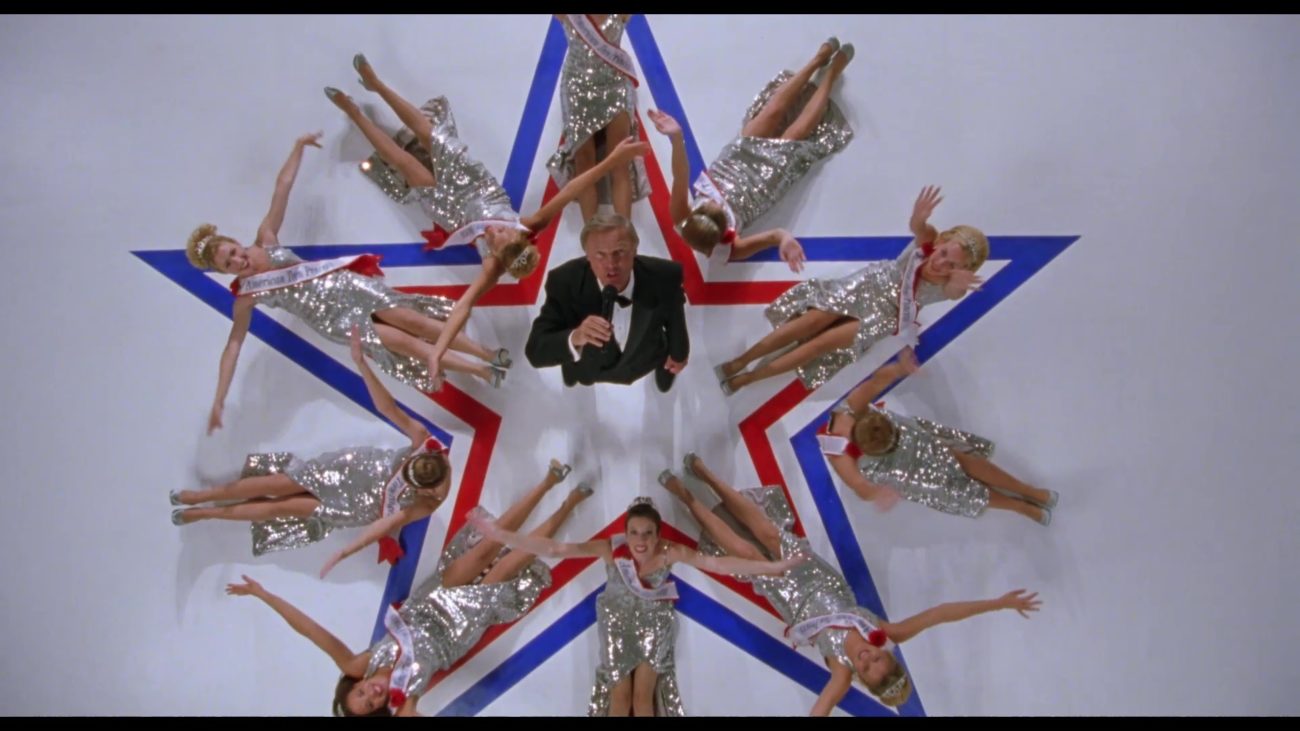
By 1999, Rob Reiner’s This Is Spinal Tap and the first of Guest’s Tap-inspired mockumentaries, Waiting for Guffman, had established the key tropes of what would prove to be a flexible, funny film form. If anything that could be (or had been) filmed could be the subject of a documentary (as the cinema verité and Direct Cinema movements had proved and increasingly portable, simple recording technologies encouraged), then anything could be the subject of a fake documentary, or mockumentary. The Reiner-Guest formula, as it would continue to evolve in the 2000s with Guest’s Best in Show and A Mighty Wind, proved that competitions, rehearsals, and performances were gold mines for mockumentary’s dryly ironic humor.
Featuring casts of clueless characters in deluded pursuit of glory, a demonstrably lo-fi approach to filmmaking, a fetishistic documenting of subcultures and obsessions, and an attentiveness to deconstructing the relationships between the makers and subjects of the documentaries being filmed, mockumentaries proved fertile for ground for filmmakers whose resources might be limited but imaginations boundless. As a genre, mockumentaries made little impact at the box office but nonetheless garnered critical acclaim and cult status among fervent devotees. Drop Dead Gorgeous was no exception, failing to crack the top 10 on its opening and barely earning back its modest $15 million budget.
Mockumentaries also proved especially apt at deconstructing the veneer of contemporary mores. The world of Drop Dead Gorgeous—technically, the little hamlet of Mount Rose, Minnesota that could be almost anywhere in the American Midwest—is the site of preparations for the pretentiously-titled Sarah Rose Cosmetics Mount Rose American Teen Princess Pageant. Tap-dancing mortician’s assistant and eternal optimist Amber Atkins (Kirsten Dunst), hopes to follow in the footsteps of her former-contestant mom Annette (Ellen Barkin) and her career-idol television journalist Diane Sawyer (herself a real-life “America’s Junior Miss”).
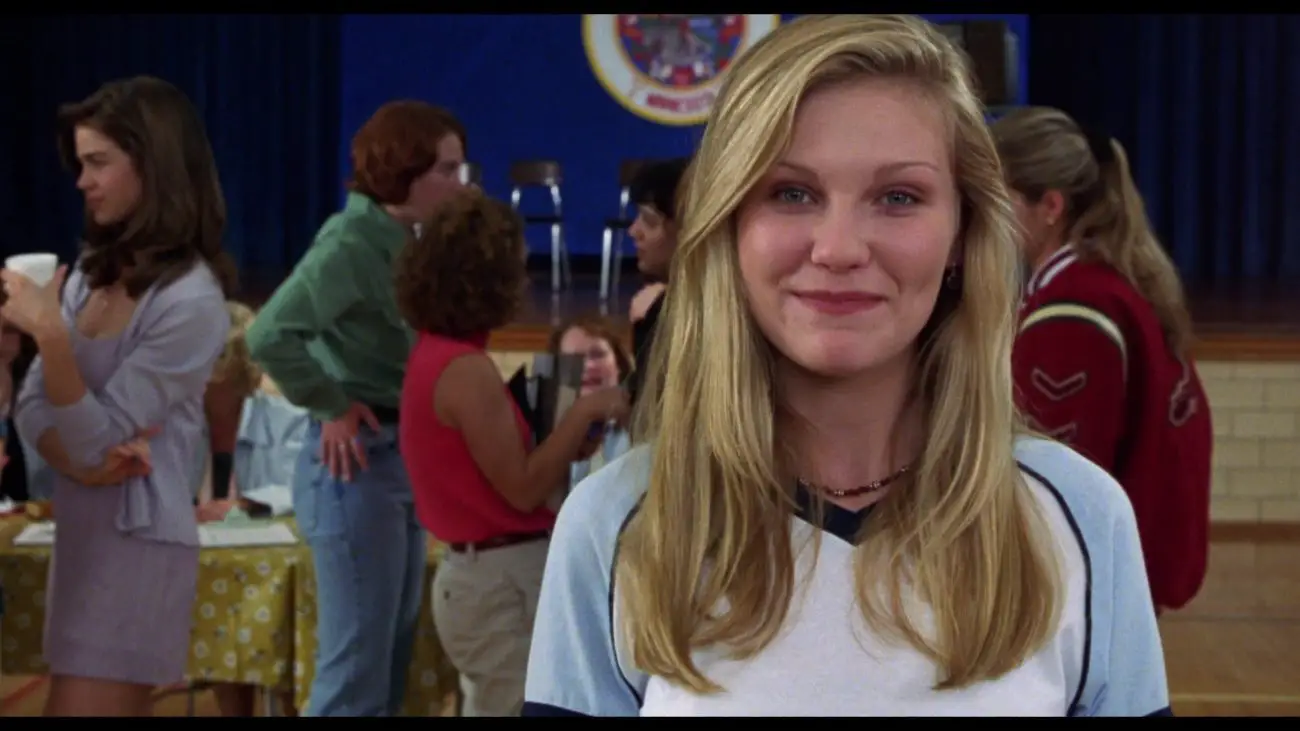
Among the other contestants looking to claim the tiara held by now-hospitalized-for-anorexia Mary Johanson (Alexandra Holden), who ran herself to exhaustion on 400 calories a day, are the sexually-charged cheerleader Leslie Miller (Amy Adams, in her first film role) and bubbly Lisa Swenson (Brittany Murphy). But the biggest threat comes from favored Becky Ann Leeman (Denise Richards), whose mother Gladys (Kirstie Alley), a former winner, chairs the pageant committee, and whose father owns the furniture business underwriting its costs.
It’s hard to imagine a more perfectly-cast comedy. Dunst brings an optimistic glee and feverish commitment to her role, perfecting her tap-talent routine even while applying makeup to the recently deceased. She’s the plucky challenger and a perfect point-of-view character. Richards was one of the more visible actors of the era with high-profile roles in Starship Troopers, Wild Things, and (as comely Christmas Jones the nuclear physicist) the Bond flick The World Is Not Enough. Richards was the butt of the joke as a Bond girl but excels at the intentional comedy of Drop Dead Gorgeous, her big rubbery lips and wide eyes betraying her character’s two-faced nature. It’s almost a shame to see her Becky meet her eventual fate. Almost.
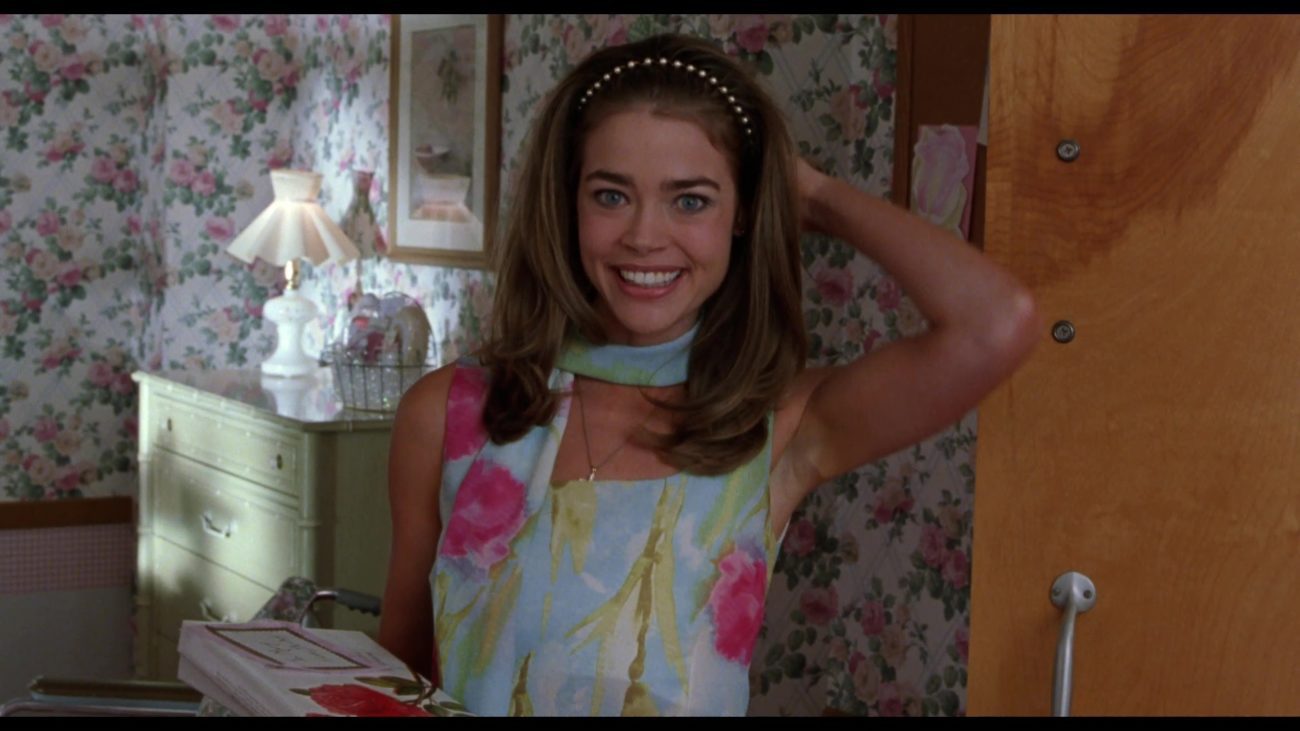
While adversaries Dunst and Richards carry the work of the narrative, the supporting cast is just as good. Brittany Murphy, only 21 at the time, shines in a small role. Allison Janney teams with Barkin as Amber’s support system and more comic relief: her aunt Loretta is as constantly on the prowl for guys as Barkin’s Annette is for beer. As the story’s “big bad” Gladys Leeman, Kirstie Alley, then star of the sitcom Veronica’s Closet, plays what was against type for her as the scheming right-wing stage mom. (Alley may today seem a little closer to Glady’s politics than anyone knew then.)
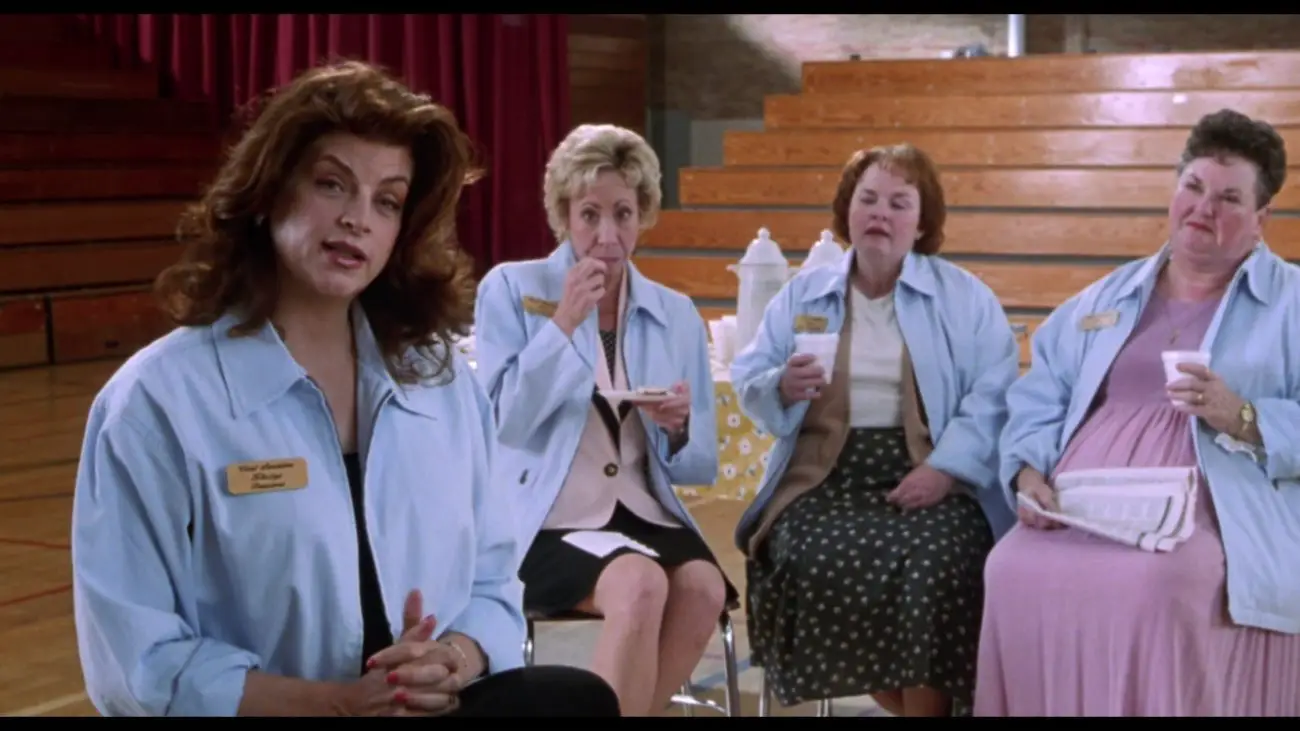
That’s a cast of known quantities (and no males except in minor roles) in Dunst, Murphy, Richards, and Alley. Who would have predicted that two decades later among the cast would be one of the world’s highest-paid actresses and a six-time Academy Award nominee? Little except her ebullient screen presence in Drop Dead Gorgeous would suggest such a bright future for Amy Adams, who was working at the Minneapolis-adjacent Chanhassen Dinner Theatre when she auditioned for the role. Alley’s encouragement led Adams to Hollywood later that year.
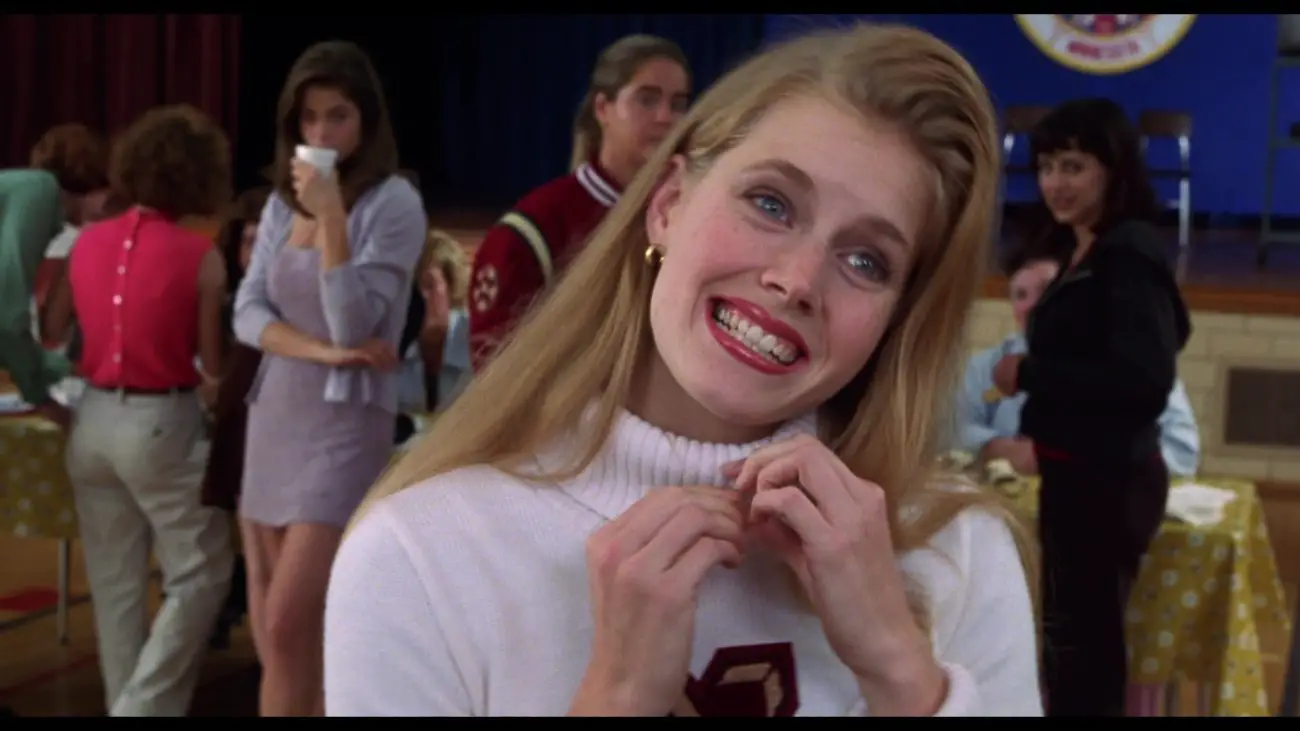
Though her role is significantly smaller than Richards’ or Dunst’s, Adams pops off the screen when on it. That her character is fervently sexually active with multiple partners is a running gag, one of a handful that seems a bit dated. But her character maintains a friendly rivalry with Dunst’s throughout—and is one of the few to survive the killing spree the film’s title imports. A few other gags like a cheerleader’s sex drive may run a bit stale, but they’re outnumbered by the gems.
Among those gems are many that hit awfully close to home. The entry to Mount Rose Hospital is marked with signage directing patients to the burn unit (right) or eating disorders (left). Gladys Leeman gleefully mocks the “big-city, no-bra-wearin’, hairy-legged women’s libbers” who don’t support pageants. Videocam-carrying pageant judge John Dough’s position is merely a cover for getting close to the contestants: “I Never judged a pageant before in my life. Nope. No way. Never around young girls. Even if I was, why would I wanna be, y’know? I- I- I don’t get off on that kinda thing and that’s really why you’re askin’, right?” he stammers.
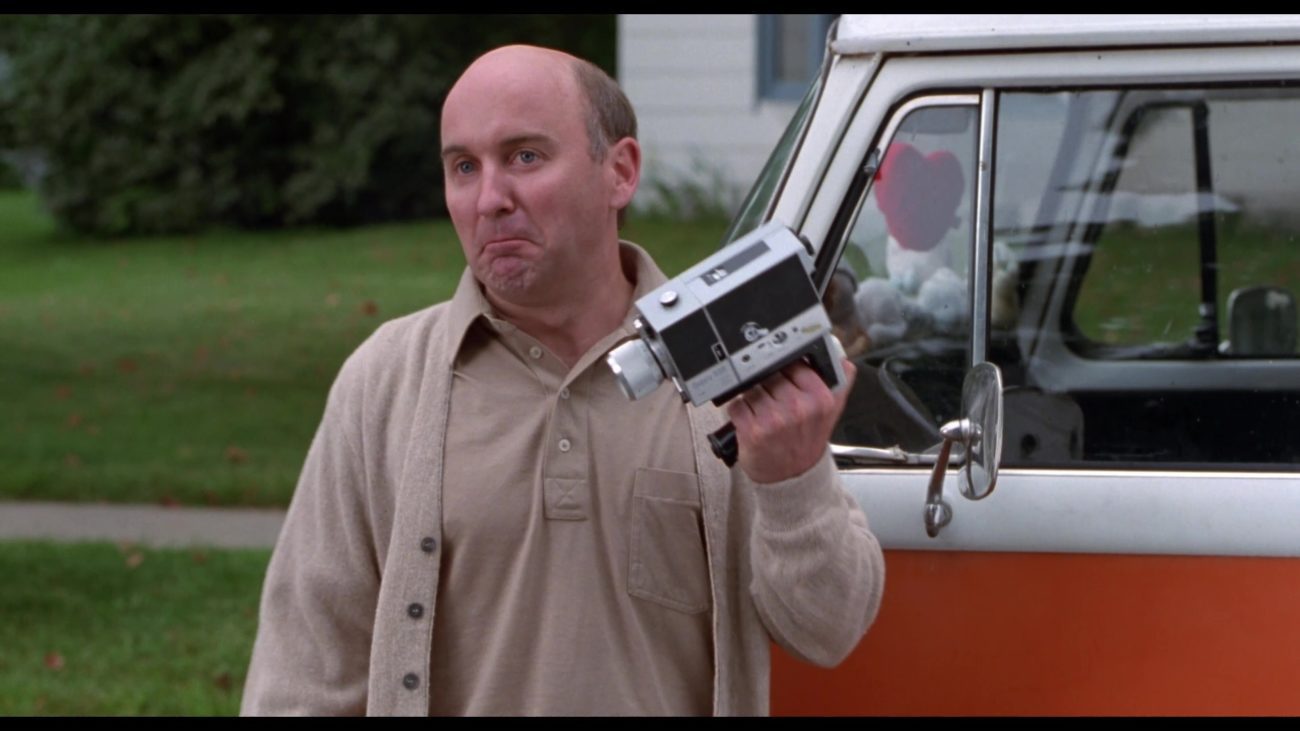
In sum, the world of Mount Rose, Minnesota, is one where the town is run by the hard-right, gun-toting, god-fearing aristocracy of its conservative Christians, fervent in detesting progressivism, a place where eating disorders are rampant enough to warrant their own hospital wing but its victims are trotted out to support the pageantry—to the tune of “Don’t Cry Out Loud,” no less. Where panties-obsessed perverts are granted access to young girls rehearsing and performing. One might wish to think the setting of Mount Rose is a fiction.
Except for the fact that much of that setting comes from writer Lona Williams’ personal experience. Raised in Rosemount, Minnesota—the “Mount Rose” setting of Drop Dead Gorgeous is both a simple inversion and a sly sexual innuendo—Williams was crowned Minnesota’s Junior Miss in 1985 and went on to earn the runner-up title at America’s Junior Miss along with a $10,000 scholarship that took her to the University of Minnesota and her first screenwriting course. (Ironically, not a little like Diane Sawyer, who used her Junior Miss winnings to earn her degree in English at Wellesley.) Williams later worked on The Simpsons and then The Drew Carey Show while writing Drop Dead Gorgeous.
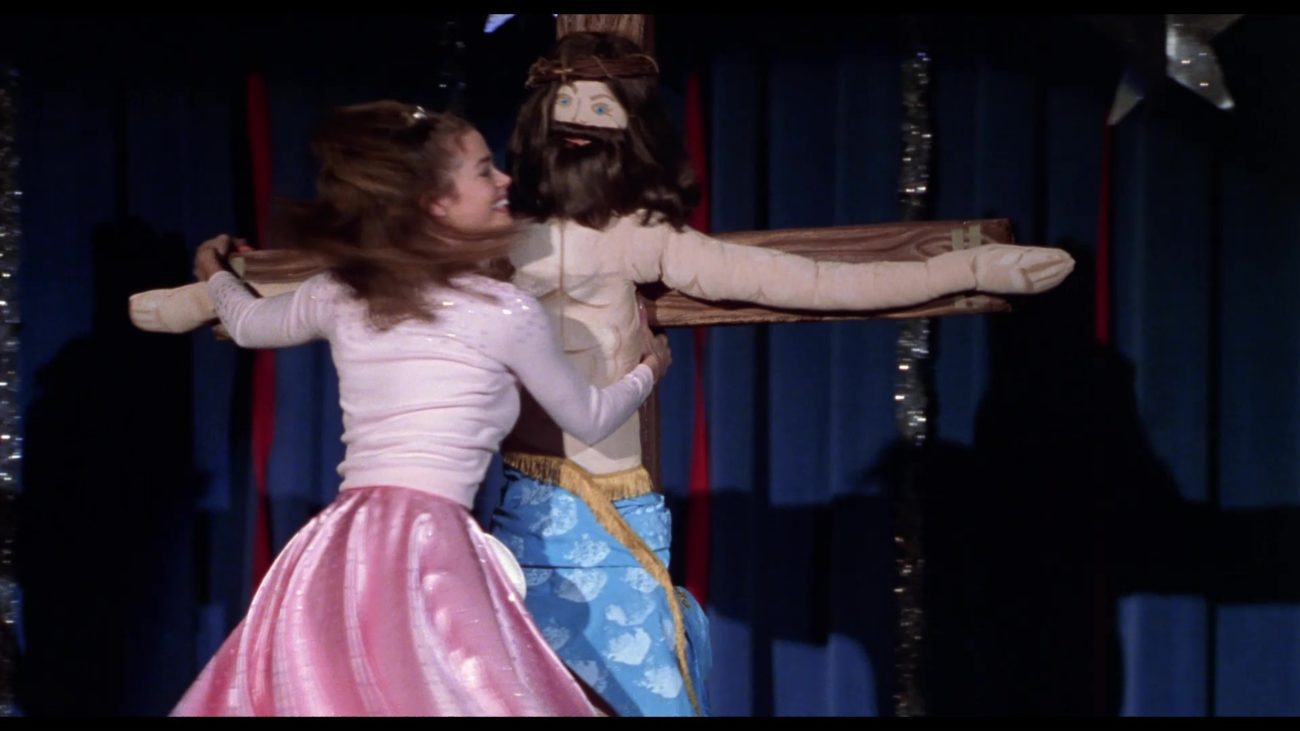
Unfortunately, Williams found the production of her first and only film a dispiriting one and did not enjoy collaboration with Alley or the film’s director. The film’s initial box-office and critical failure was dispiriting and Williams largely disappeared from Hollywood. Director Michael Patrick Jann did not make another film, instead working in television. And for a time Drop Dead Gorgeous languished largely unseen. That the film did not find its audience in 1999 is disappointing given its savage humor and stellar cast. The year, as Raftery’s volume demonstrates, was one in which cinematic innovation and subversive humor was often celebrated. But Drop Dead Gorgeous may have been too wicked even for turn-of-the-century fans of Election and Fight Club.
It was, after all—spoiler alert!—a film in which a cruel stage mom is responsible not only for the series of mysterious deaths in Mount Rose but even for her own daughter’s spontaneous combustion. Speaking of which, the film’s narrative intensity flags a bit when Richards’ duplicitous Becky is no longer onscreen as a foil to Dunst’s hardworking optimism. But Williams’ script does not conclude with ambitious Amber’s coronation-by-default: to do so would be to suggest that winning the pageant is the ultimate goal, and that’s not an ideology to which she or the film subscribes. If Amber’s idol Diane Sawyer wasn’t satisfied with a winner’s sash and tiara, why should she be?
Instead, the last act of Drop Dead Gorgeous is telling. The state-level winners arrive by bus at the national pageant, but there they learn that the sponsoring cosmetics company was shut down for tax evasion. The corporation exists to bilk investors and evade taxes, not to support the wellbeing of young women. The pageant dream Amber chased was illusory, and some time later, her real victory occurs when, in the middle of Gladys’s sniper attack, she calmly grabs the mic and commands the camera from a felled field reporter.
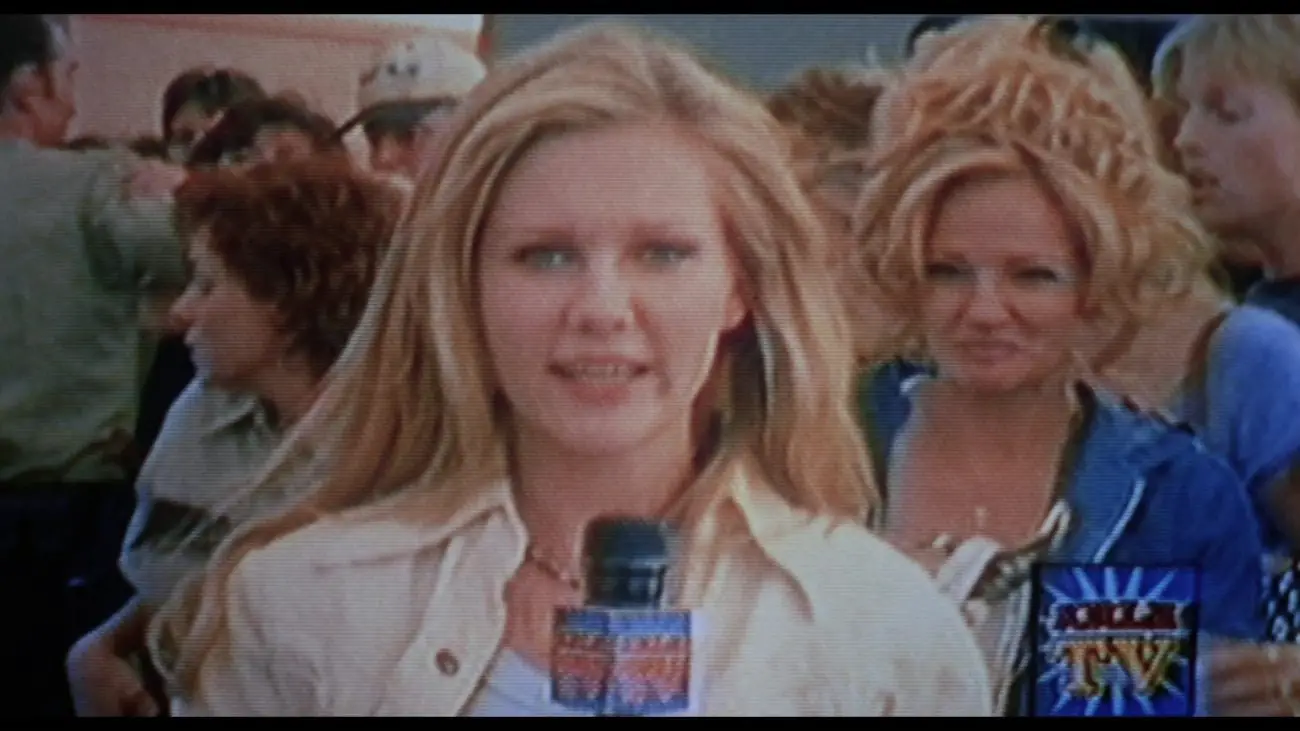
It’s her first real step to becoming the next Diane Sawyer: she soon lands a gig as morning anchor at a Minneapolis TV station. Guileless, hardworking, effervescently—and naturally, unlike her rival Becky—cheerful, Amber begins to realize her dream. And that dream wasn’t to be a pageant princess, it was to become a successful career woman, with the tiara just a rung on the ladder on the way there. Her ability to bond with her fellow competitors (Becky excluded) fosters and promotes a sense of feminist sisterhood that informs Drop Dead Gorgeous throughout.
In 1999, perhaps the film’s satire of white evangelical Christianity and its fervor against gun culture and crass capitalism cost it some viewers. Becky is an avid shooter; Tammy is the newly elected president of the “Lutheran Sisterhood Gun Club”; Gladys, we learn later, is prone to gun violence. The Childcare Action Project rated the film a “flashing red light” for its “mockery of Jesus and the Gospel” and citing its multiple infractions: violence, crime, sexuality, impudence, and something called “gamming” with which I am unfamiliar and afraid to Google.
But I wonder: had her character survived, where would a Becky Ann Leeman be today? Prosecuted, perhaps, for her role in the January 6, 2021 insurrection? A recent report suggests that more self-identifying Christians than ever today support the acts of the insurrectionists. Isolating themselves within ever-more-radicalized communities and depending increasingly and solely on right-wing news platforms, 40% of them agreed with the statement that “true American patriots may have to resort to physical violence in order to save our country.”
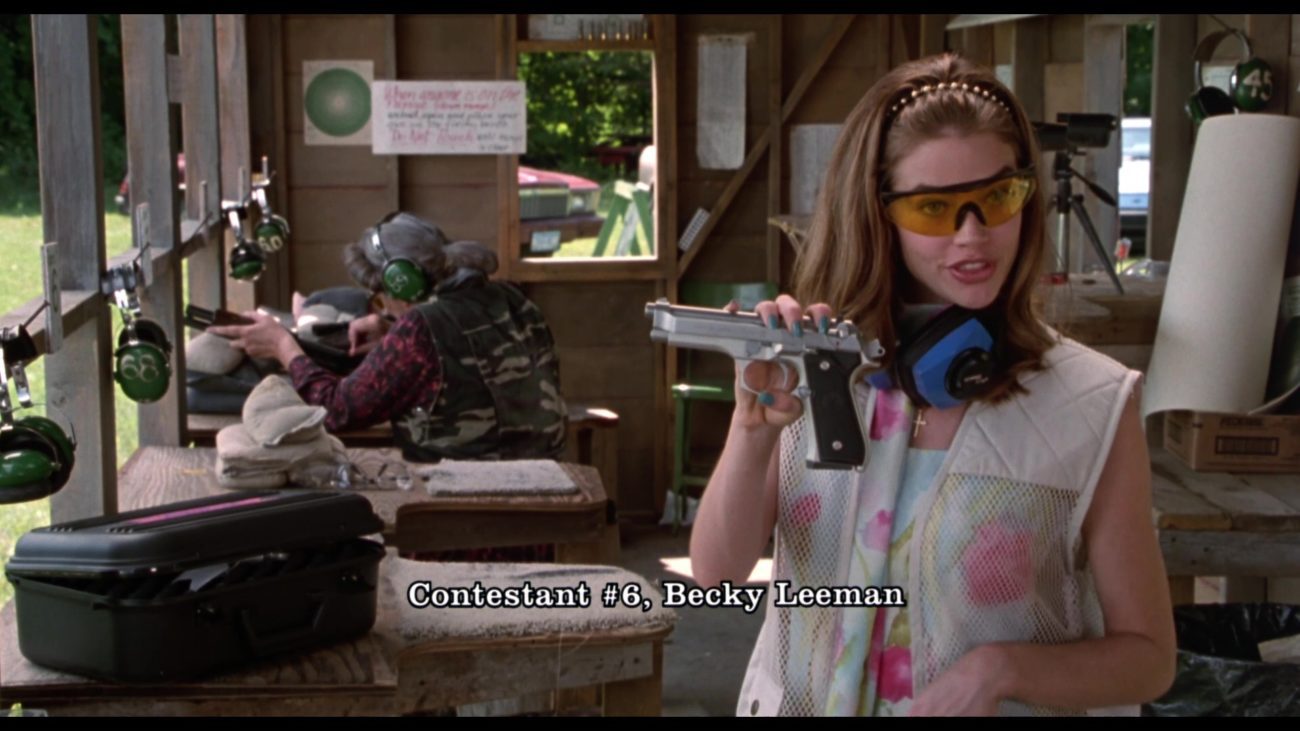
At the time of Drop Dead Gorgeous, religious fanaticism might have felt a little less of an existential threat to democracy and more of a simple target for innocuous satire. Today, in the wake of a near-miss coup and the continued use of religious rhetoric by right-wing fanatics to threaten violence, the clever satire of Drop Dead Gorgeous’ God-and-guns set seems tame by comparison. But it was then and still is entirely on target, given the increasingly violent, worrisome, and extrabiblical presence of Christian nationalism.
Sadly, Drop Dead Gorgeous is no easier to find today than it was in the doldrums of its initial post-release years. For all its pleasures—including Mark Mothersbaugh’s soundtrack and especially Joan Jett’s rocking cover of the Mary Tyler Moore Show theme “Love Is All Around” at the end credits—the film has received only the barest-of-bones physical releases. It has only intermittently shown up on streaming. It might require tracking down a blu-ray copy from an internet seller or public library to revel in its gleeful takedown of pageant culture and flyover-country conservatism.
But trust me. If you’re the type to enjoy a a giddy-but-pointed mockumentary, a film that skewers conservative values and religious fanaticism, or even if you are just (Christmas) Jonesing to see Denise Richards serenade an effigy of Christ on the cross—on casters!—Drop Dead Gorgeous is your kind of film.



